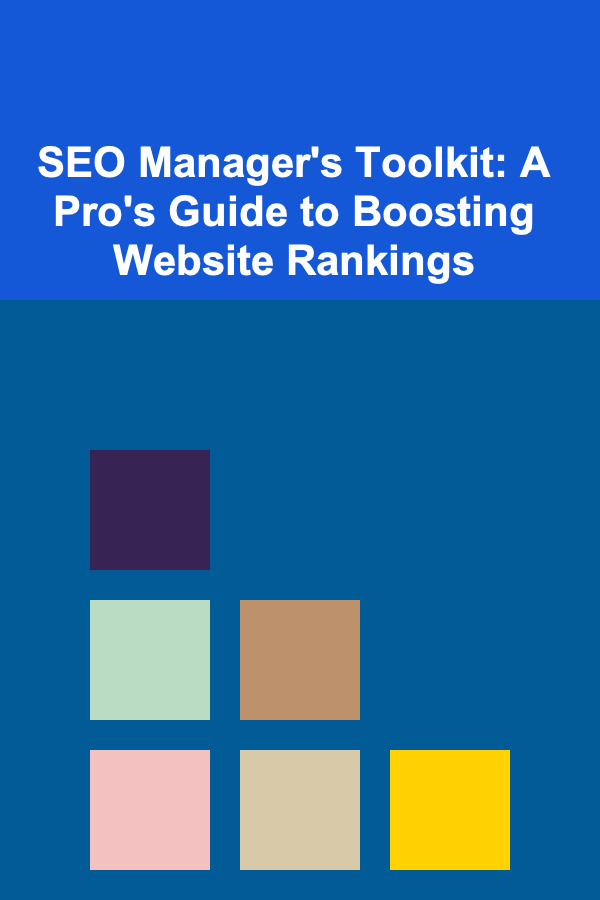
SEO Manager's Toolkit: A Pro's Guide to Boosting Website Rankings
ebook include PDF & Audio bundle (Micro Guide)
$12.99$8.99
Limited Time Offer! Order within the next:

As an SEO manager, you're at the forefront of ensuring your website stands out in search engine rankings. With search engine algorithms evolving and the digital landscape becoming more competitive, it's crucial to have a comprehensive toolkit that allows you to take action and adapt to changes efficiently. In this actionable guide, we'll explore key tools, strategies, and best practices that can elevate your SEO game and help you improve your website's rankings.
Understanding the Core of SEO
Before diving into the toolkit, it's essential to understand that SEO is a multifaceted discipline that requires a combination of both technical and creative strategies. It isn't about short-term tricks; it's about crafting a sustainable and high-quality online presence. The major areas of SEO that need focus are:
- On-Page SEO: Optimizing individual pages to rank higher.
- Technical SEO: Ensuring the site's technical structure is search engine-friendly.
- Off-Page SEO: Building authority and trust through backlinks and brand mentions.
Having a strong toolkit allows you to address all these areas with precision, making sure you cover every angle to boost website rankings.
Keyword Research Tools
1.1. Google Keyword Planner
Google Keyword Planner is a free tool that can help SEO managers identify potential keywords for their content. It's especially useful for understanding search volume and trends. As part of your keyword research process, you can input seed keywords and discover variations and long-tail keywords that can attract the right audience.
Actionable Tip: When using Google Keyword Planner, focus on both short-tail and long-tail keywords. Short-tail keywords are more competitive, but they have high search volume, while long-tail keywords are less competitive and often more specific, leading to higher conversion rates.
1.2. Ahrefs Keywords Explorer
Ahrefs is one of the most robust SEO tools available. Its Keywords Explorer helps you uncover a variety of keyword ideas, analyze search volume, difficulty, and competition, and dive deep into competitor keyword strategies. Ahrefs' data is especially helpful for uncovering gaps in your current content strategy.
Actionable Tip: Look for keyword opportunities where competitors have low authority, yet high search volume. These are often untapped opportunities where you can outrank the competition with a well-targeted content piece.
1.3. SEMrush Keyword Magic Tool
SEMrush offers a Keyword Magic Tool that provides comprehensive keyword suggestions with detailed filters for search intent, competition, and search volume. SEMrush also offers keyword tracking so you can keep an eye on how your target keywords are performing over time.
Actionable Tip: Use the "Keyword Difficulty" filter to identify keywords that are attainable for your website's current domain authority. Combining low-difficulty keywords with relevant content will boost your chances of ranking higher.
On-Page SEO Optimization
On-page SEO refers to the elements on your website that you can control directly. This includes optimizing your content, title tags, meta descriptions, URLs, and more. The goal is to make your content both appealing to search engines and user-friendly.
2.1. Yoast SEO (for WordPress)
Yoast is one of the most popular SEO plugins for WordPress, providing a wide array of on-page SEO optimizations, including keyword optimization, readability checks, and snippet preview. This plugin helps ensure that you optimize title tags, meta descriptions, headings, and internal linking structure.
Actionable Tip: When using Yoast, always make sure your title tag and meta description are optimized for the target keyword. Yoast will help you determine whether the content is missing or overstuffed with keywords.
2.2. SEO Optimized URL Structure
Creating a clean, concise, and descriptive URL structure is essential for on-page SEO. Search engines prioritize URLs that are easy to read, and users tend to click on URLs that are well-organized.
Actionable Tip : Always keep URLs short, descriptive, and keyword-rich. For example, use example.com/seo-optimization-guide rather than example.com/1234-id.
2.3. Content Quality and Structure
Content is the heart of SEO, but simply producing content isn't enough. To optimize content for search engines, it's crucial to focus on the following:
- Keyword Placement: Ensure that your target keywords are placed in the first 100 words of the content, in headings, and naturally throughout the article.
- Readability : Tools like Hemingway Editor can help ensure that your content is easy to read for users, which also affects your bounce rate and engagement.
- Multimedia: Include relevant images, videos, and infographics to enrich your content and improve user experience.
Actionable Tip: Use semantic search techniques by including variations of your main keyword, LSI keywords, and related terms to give Google a more holistic understanding of your content's topic.
Technical SEO
Technical SEO is essential to ensure that your site is accessible, crawlable, and indexable by search engines. If search engines can't access your site properly, all other SEO efforts are in vain.
3.1. Screaming Frog SEO Spider
Screaming Frog is an SEO crawler tool that analyzes your site for technical issues such as broken links, duplicate content, and poor metadata. It crawls your website and provides a detailed report on areas needing improvement.
Actionable Tip: Regularly crawl your site with Screaming Frog to check for broken internal and external links. Fixing these links can significantly improve your website's SEO health.
3.2. Page Speed Optimization Tools
Site speed is a crucial ranking factor, and slow-loading pages can hurt your SEO performance. Tools like Google PageSpeed Insights and GTmetrix allow you to analyze and optimize your website's page load time by identifying areas that need improvement.
Actionable Tip: Aim for a page load time of under 3 seconds. Compress images, use lazy loading, and reduce the use of heavy scripts to speed up your site.
3.3. Mobile Optimization
Mobile optimization is no longer optional---Google uses mobile-first indexing, meaning it primarily uses the mobile version of your website to rank content. Test your mobile responsiveness using Google's Mobile-Friendly Test tool.
Actionable Tip: Ensure that your website design is responsive and provides a seamless experience across mobile devices. Avoid pop-ups or intrusive ads that can disrupt the user experience.
Off-Page SEO: Building Authority
Off-page SEO focuses on activities outside your website that impact your rankings, primarily backlinks and brand mentions. Building a solid backlink profile is crucial for gaining domain authority and improving search engine rankings.
4.1. Backlink Analysis Tools: Ahrefs and Majestic
Ahrefs and Majestic are two of the leading backlink analysis tools. They allow you to explore your backlink profile and monitor the quality of links pointing to your site. Building quality backlinks from authoritative sites is a cornerstone of off-page SEO.
Actionable Tip: Use these tools to identify competitors' backlinks and target opportunities where you can acquire similar or higher-quality links.
4.2. Guest Blogging and Outreach
Guest blogging is a proven method for gaining high-quality backlinks, improving brand exposure, and positioning yourself as an authority in your industry. Reach out to blogs in your niche to offer valuable content in exchange for a backlink.
Actionable Tip: Focus on websites with a similar or higher domain authority and ensure that the content you contribute adds value to the website's audience.
4.3. Social Media Signals
Although social media signals don't directly affect rankings, active engagement on social platforms can drive traffic to your website and enhance brand visibility. Search engines notice increased traffic from social media, which can indirectly influence your rankings.
Actionable Tip: Regularly share your content on social media and engage with your audience. Encourage user-generated content, shares, and mentions of your brand.
SEO Performance Tracking and Analytics
To ensure that your SEO efforts are paying off, it's vital to track your performance regularly. Monitoring key SEO metrics such as organic traffic, keyword rankings, and backlinks is crucial for optimizing your strategy.
5.1. Google Analytics and Google Search Console
Google Analytics and Google Search Console are indispensable for tracking your website's SEO performance. Google Analytics gives insights into user behavior, while Google Search Console helps monitor search rankings, crawl errors, and website performance issues.
Actionable Tip: Regularly check Google Search Console for crawl errors, performance drops, and any penalties. Use Google Analytics to track page visits, bounce rates, and user interactions with key pages.
5.2. Rank Tracking Tools: SEMrush and Moz
Rank tracking tools like SEMrush and Moz allow you to monitor your keyword rankings over time and gauge the success of your SEO efforts. You can set up tracking for specific keywords, regions, and devices.
Actionable Tip: Track a mix of competitive, long-tail, and branded keywords to understand how well your overall SEO strategy is performing.
Continuous Learning and Adaptation
SEO is constantly evolving, and keeping up with the latest trends and algorithm updates is vital to staying ahead. Make sure you're subscribed to industry blogs, attend webinars, and network with other professionals to keep your skills sharp.
Actionable Tip : Follow authoritative SEO blogs like Search Engine Journal , Moz , and Backlinko for the latest trends and updates.
By using these tools and strategies, SEO managers can build a comprehensive SEO strategy that improves rankings, drives traffic, and delivers measurable results. A well-rounded toolkit, when used effectively, allows you to stay competitive in the ever-evolving world of SEO.
Reading More From Our Other Websites
- [Star Gazing Tip 101] Best Multi‑Filter Sets for Capturing Colorful Emission Nebulae with Small Telescopes
- [Home Soundproofing 101] How to Soundproof Your Home for a Better Night's Sleep
- [Mindful Eating Tip 101] How to Combine Mindful Eating with a Low‑FODMAP Diet for IBS Relief
- [Beachcombing Tip 101] From Seashells to Sea Glass: A Beginner's Checklist for Spotting Treasure on the Beach
- [Home Space Saving 101] How to Maximize Space with a Sewing Table with Storage
- [Home Budget 101] How to Stay Motivated to Stick to Your Home Budget Long-Term
- [Home Budget 101] How to Reduce Your Home's Energy Consumption on a Budget
- [Home Pet Care 101] The Ultimate Guide to Crate Training
- [Personal Care Tips 101] How to Use a Facial Cleanser for Optimal Skin Benefits
- [Personal Finance Management 101] How to Find and Cut Hidden Subscriptions Draining Your Wallet

How to Install Soundproof Curtains for Better Noise Control
Read More
How To Understand the Genetics of Intelligence
Read More
How to Use Meal Planning to Save Money on Home Food Expenses
Read More
How To Power Wash Your House Exterior
Read More
Understanding Renewable Energy Grids of the Future
Read More
How to Effectively Communicate with Flight Crew: A Flight Dispatcher's Perspective
Read MoreOther Products

How to Install Soundproof Curtains for Better Noise Control
Read More
How To Understand the Genetics of Intelligence
Read More
How to Use Meal Planning to Save Money on Home Food Expenses
Read More
How To Power Wash Your House Exterior
Read More
Understanding Renewable Energy Grids of the Future
Read More